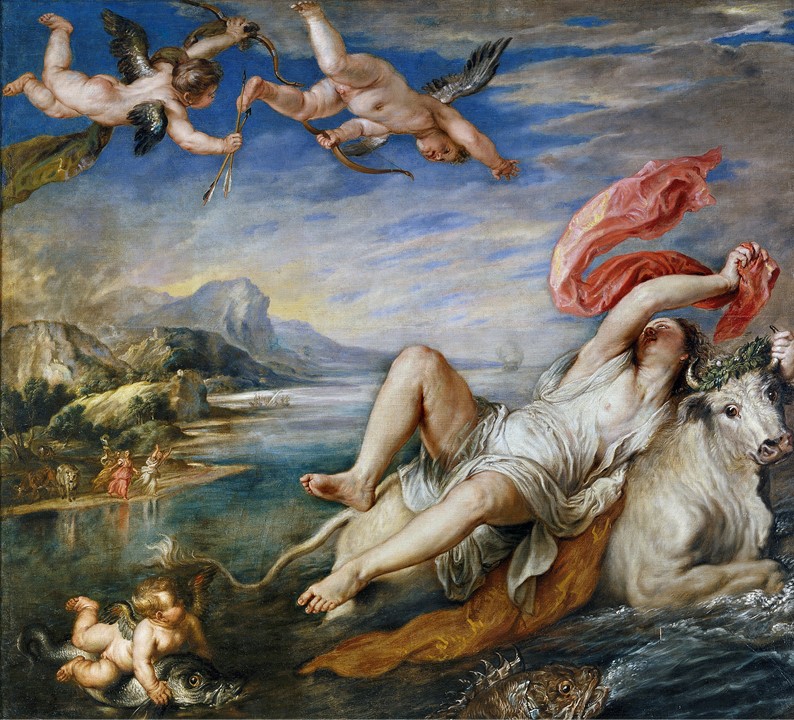
The Rape of Europa, between 1560 and 1562, Oil on Canvas, 178 × 205 cm, Isabella Stewart Gardner Museum, Boston, USA
https://upload.wikimedia.org/wikipedia/commons/a/a3/L%27Enl%C3%A8vement_d%27Europe_Rubens.jpeg
Titian in the Isabella Stewart Gardner Museum is about an amazing Exhibition titled Titian – Women, Myth & Power running from August 12 to January 2, 2022. The Exhibition presents Titian’s poesie — or painted poetries — that envision epic stories from classical Antiquity. These poesies were created between 1551 and 1561, for King Philip II of Spain, by no other than the incredible Venetian artist, Titian! It is, undoubtedly, priceless, for the Exhibition visitor, to be able to see for the first time in over four centuries, the renowned paintings reunited… conversing with each other. For the Isabella Stewart Gardner Museum, inspiration was, I can only guess, their own painting of Titian’s… Rape of Europa. https://www.gardnermuseum.org/calendar/exhibition/women-myth-power
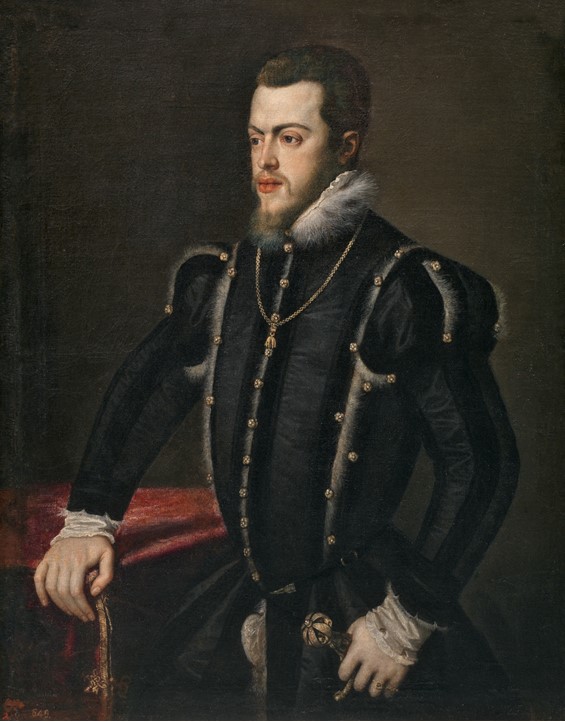
Philip II of Spain, between 1549 and 1550, Oil on Canvas, 103×82 cm, Museo del Prado, Madrid, Spain
https://upload.wikimedia.org/wikipedia/commons/e/ec/Philip_II_portrait_by_Titian.jpg
Not every painter has a gift for painting, in fact, many painters are disappointed when they meet with difficulties in art. Painting done under pressure by artists without the necessary talent can only give rise to formlessness, as painting is a profession that requires peace of mind. The painter must always seek the essence of things, always represent the essential characteristics and emotions of the person he is painting… Titian believed and applied when, between 1549 and 1550, he painted the Portrait of his most important patron, Philip II of Spain, the man with whom, the artist established one of the most fruitful artistic relationships of the European Renaissance. This fruitful artistic relationship between the aging Venetian Master, and the 21-year-old Prince of Spain, at the time, led to the poesie paintings… large canvases inspired by stories taken from Ovid’s (43 BC–17 AD) Metamorphoses and other Classical works. https://www.azquotes.com/quote/1112271 and https://www.museodelprado.es/en/the-collection/art-work/philip-ii/7249afc2-e80c-4e47-8dba-0dda1758a9aa and https://www.nationalgallery.org.uk/exhibitions/past/titian-love-desire-death/titian-s-poesie-the-commission
Titian, given free rein by Philip to choose the subjects and to create new and innovative compositions, outdid himself choosing Myths that involve Gods and Mortals, Love and Death… The artist chose Myths that rely on powerful emotions, curiosity, jealousy, love, and desire, for their drama. https://www.nationalgallery.org.uk/exhibitions/past/titian-love-desire-death/mary-beard-on-titian-and-ovid
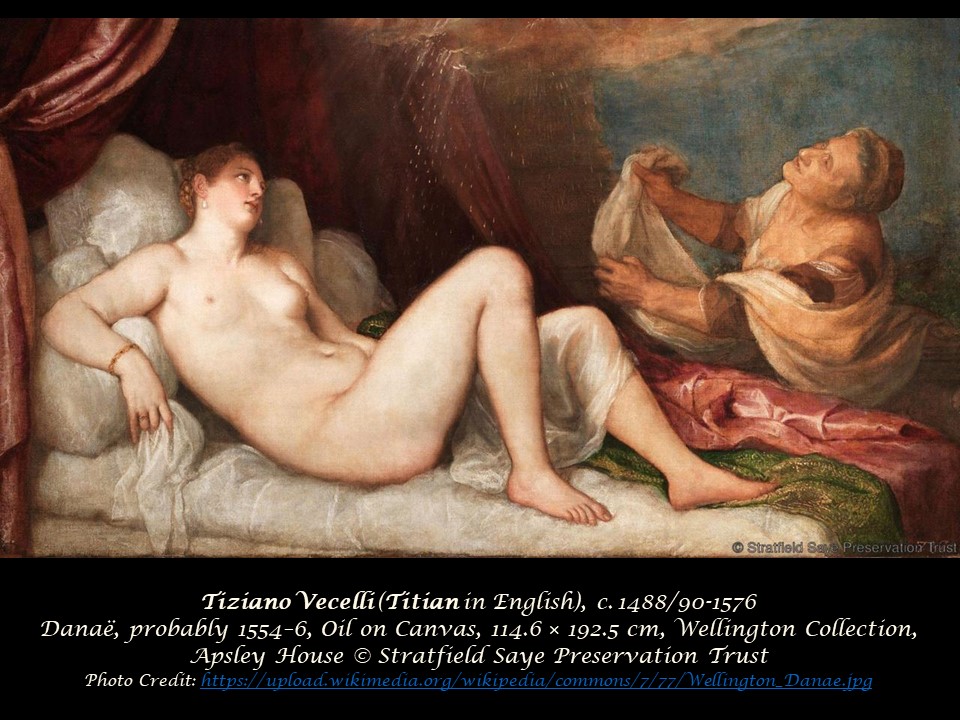
Danaë… Although Danaë was isolated at the top of a tower by her father, King Acrisius of Argos, in an attempt to prevent her from becoming a mother, Zeus sought her out and in the form of a shower of gold, impregnated her. Titian’s Danaë, one of his favourite mythological women, ever sensual and voluptuous, was always a woman depicted at the moment in which Zeus possesses her in the form of golden rain, surprised, contented, and innocent looking. Danaë was the first Poesie presented to Prince Philip. https://www.english-heritage.org.uk/siteassets/home/visit/places-to-visit/apsley-house/history/significance/conserving-titians-mistress/titian-exhibition-guide.pdf
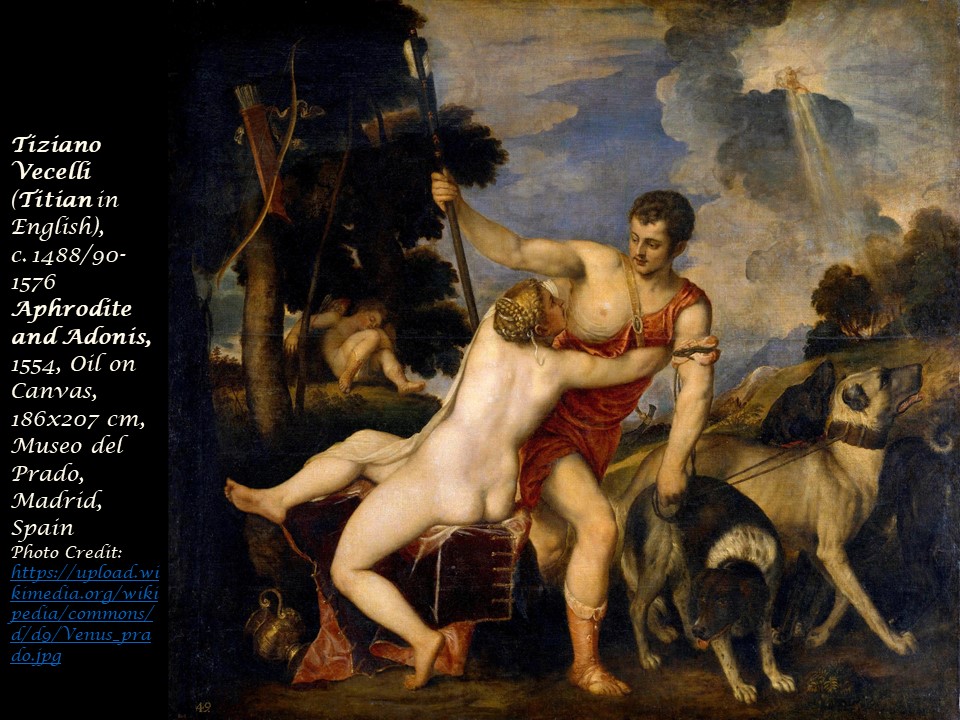
Titian’s Aphrodite and Adonis, presents a moment… not described in Ovid’s Metamorphoses or any other classical source. Invenzioned by Titian… the painting portrays Adonis, ready for the hunt, separating himself from Venus´s embrace. This is a scene of seduction, female initiative, and scandalous behaviour. Aphrodite, in a desperate effort, tries to restrain her lover with a seductive embrace… all in vain, Adonis’s fate is sealed!https://www.museodelprado.es/en/the-collection/art-work/venus-and-adonis/bc9c1e08-2dd7-44d5-b926-71cd3e5c3adb
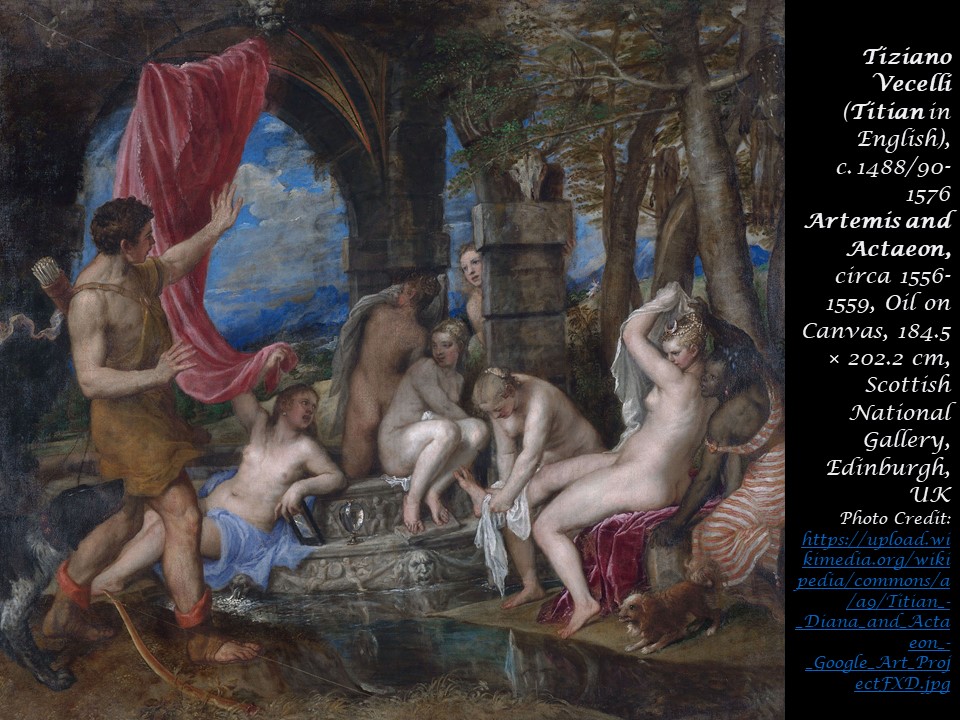
While out hunting, Actaeon accidentally discovered the secret bathing place of Artemis, goddess of the moon and hunt. Titian’s Artemis and Actaeon, in the National Galleries of Scotland, chose to portray the exact inciting incident when the victims’ fate is sealed. A dramatic intrusion scene, a dynamic arrangement of figures, sparkling light, intense colour, and animated brushwork… Titian’s painting is a glimpse of the artist’s ability to create magic! https://www.nationalgalleries.org/art-and-artists/8685/diana-and-actaeon
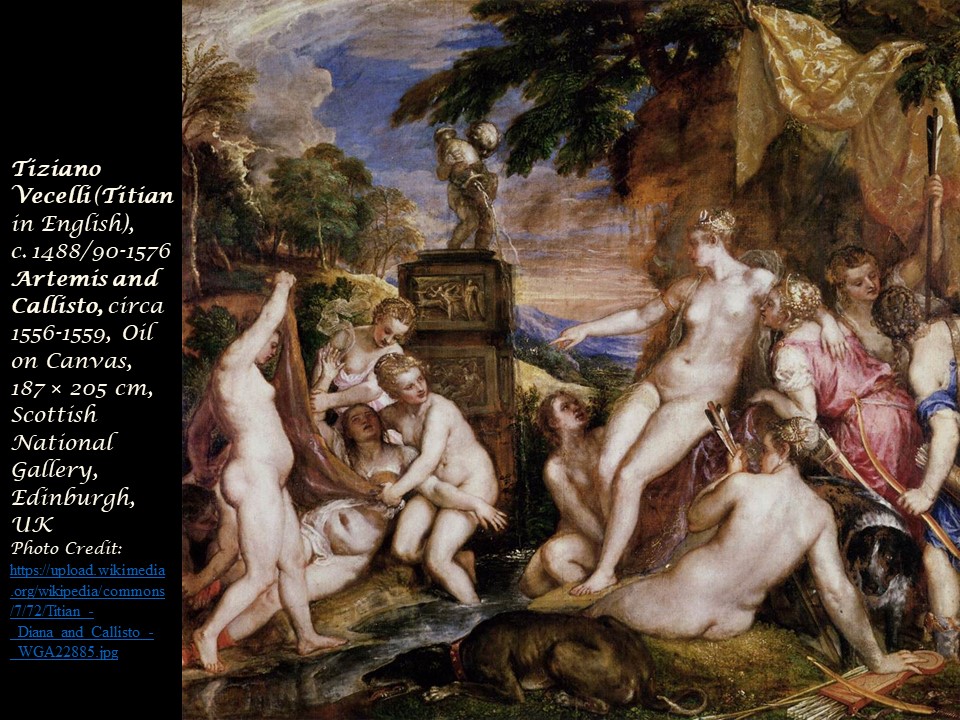
Every time I see the constellation of Ursa Major, I think of Callisto, Zeus, Hera, and Artemis, a myth of innocence, violence, wrath, and punishment… a Renaissance painting by Titian, Artemis and Callisto, and a Patron who loved women and hunting… https://www.nationalgalleries.org/art-and-artists/artists/titian-tiziano-vecellio
Titian’s Rape of Europa, painted in Venice in the 1560s, is inspired by a story from Ovid’s Metamorphoses. Infatuated with Europa, Jupiter—king of the gods—transforms himself into a beautiful white bull and joins a herd grazing near the seashore. Europa, close by with her companions, approaches the beautiful creature with her hand outstretched. Finding him tame, she plays with the bull in a meadow and entwines flowers around his horns. When she climbs playfully on his back, the mischievous god seizes the opportunity and springs into the sea, spiriting away the target of his affections while she clings to him in terror… waving desperately at her companions on the shore. https://www.gardnermuseum.org/experience/collection/10978
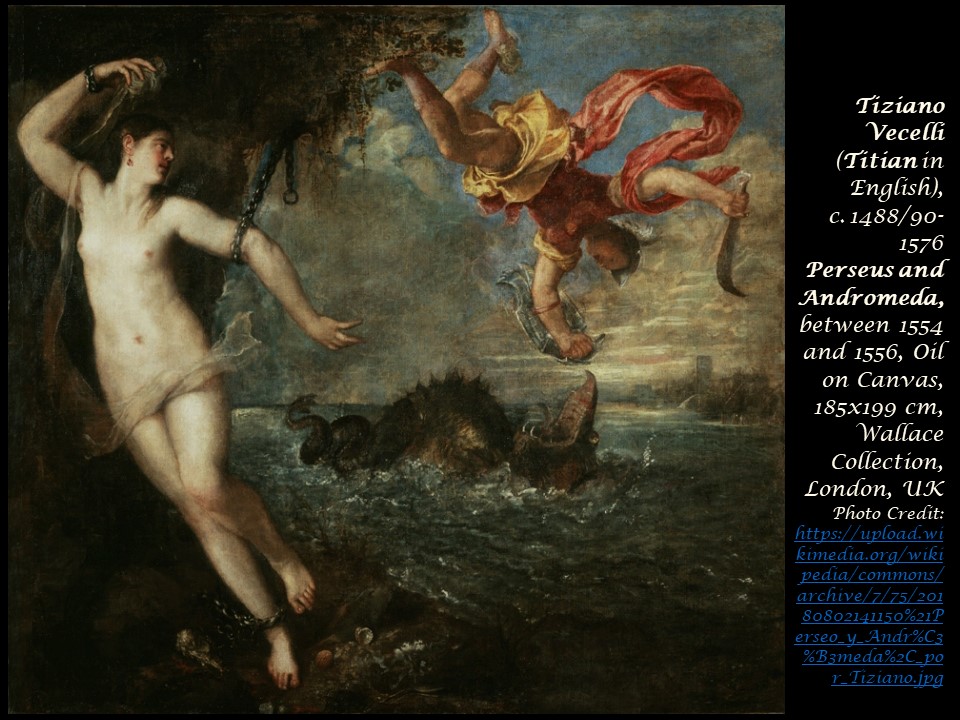
Arrogance, revenge, sacrifice, bravery…the Myth of Perseus and Andromeda, has it all! Painted between 1551 and 1562 by Titian, a poesie for King Philip II of Spain, is an epic scene of heroic bravery. Perhaps, the most dramatic of all poesie paintings, shows how Perseus, Danaë’s son, swoops down to rescue Andromeda, his powerful vertiginous descent contrasting vividly with her passive vulnerability. https://www.wallacecollection.org/blog/the-wallace-collections-first-transatlantic-loan/
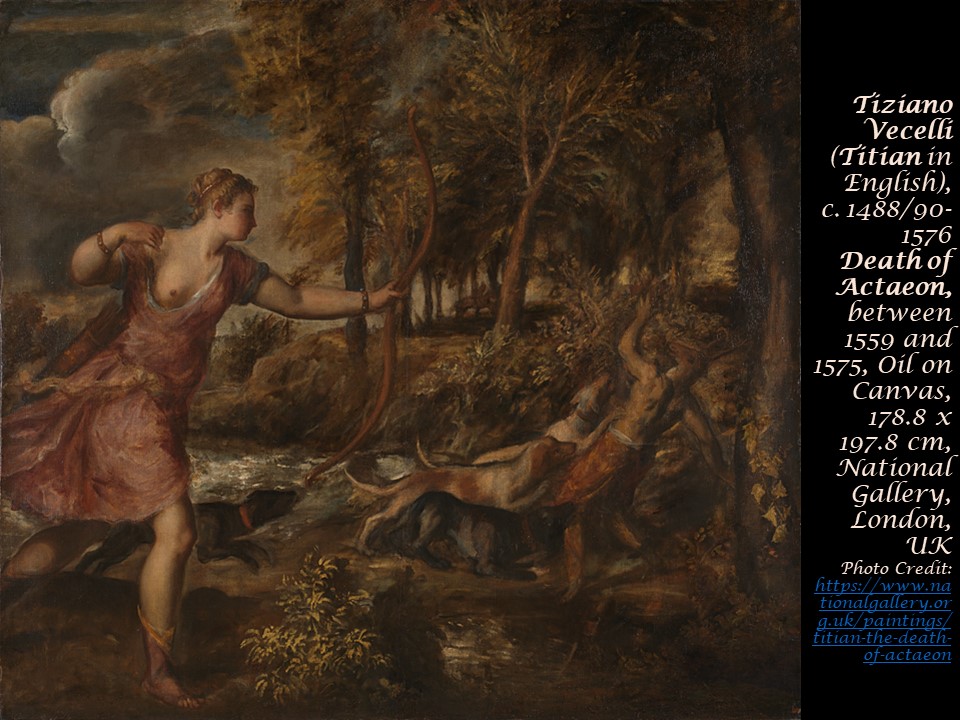
Although never delivered to Philip II, the last of Titian’s poesie, the Death of Actaeon, is another powerful painting of unprecedented originality as the subject is rare in Italian art and Titian may never have seen another painting of it. With dynamic brushstrokes and majestic colours, Titian depicts the moment of divine wrath and punishment… Actaeon in the process of transformation is torn to death by his own hounds! https://www.nationalgallery.org.uk/paintings/titian-the-death-of-actaeon
Short Video Presentation on the five Poesies by Titian… https://www.nationalgallery.org.uk/exhibitions/past/titian-love-desire-death/facebook-live
An interesting Video by Mary Beard on Titian and Ovid… https://www.nationalgallery.org.uk/exhibitions/past/titian-love-desire-death/mary-beard-on-titian-and-ovid
For the PowerPoint on Titian’s Poesies, please… Click HERE!